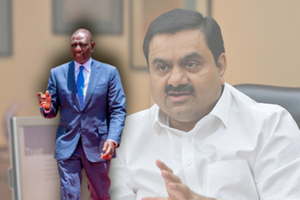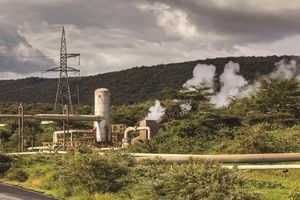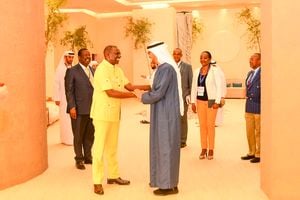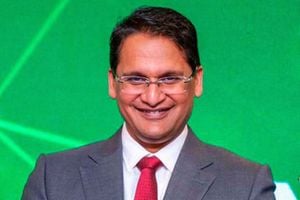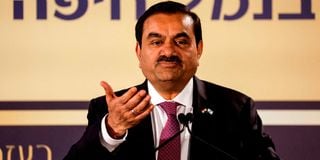
Indian billionaire Gautam Adani speaks during an inauguration ceremony after the Adani Group completed the purchase of Haifa Port earlier in January 2023, in Haifa port, Israel January 31, 2023.
Gautam Adani is no mere billionaire… In India, he is a towering force in the country’s economic and political landscape and is effortlessly introduced to visiting presidents and prime ministers by the country’s Prime Minister Narendra Modi – who campaigned using Adani’s jet.
When he cast his eyes on Kenya’s lucrative sectors, those who know his business dealings knew he would have his way. “Mr Adani is so central to India's politics that he can broker deals between sworn rivals,” observed The New York Times. Over the past decade, Adani Group, and with Modi in power, his sprawling conglomerate, has evolved into an unparalleled powerhouse, undertaking monumental projects that align with state directives.
From constructing and acquiring ports, factories, and power plants to operating airports and even owning a television news channel, Adani’s empire is not only India’s story abroad, but as The Washington Post put it: The billionaire is “seen as an arm of Indian domestic and foreign policy — and a proxy for Prime Minister Narendra Modi”.
Before he was accused of duping US investors to put their money into a massive solar energy project in India, said to be facilitated by payment of bribes, Adani was the darling of Kenya’s political class and had been introduced to Kenya, like in other nations, through State House. When President William Ruto defended his administration’s controversial engagement with Adani, and his lieutenants echoed in unison, critics saw more than overt deal.
Despite widespread protests, the Ruto regime approved a controversial $736 million deal with Adani Energy Solutions Ltd and endorsed the proposed leasing of Jomo Kenyatta International Airport. Ruto, who had visited India in December 2023 and had a meeting with Modi, was eager to defend Modi’s business and political ally. In public forums and on social media, a pro-Adani campaign was orchestrated, with government officials and bloggers deployed to promote the deal and obscure its evidently scandalous nature.
Interestingly, the President found an unexpected ally in opposition veteran Raila Odinga, who voiced support for the government’s public-private partnership (PPP) with the controversial Indian contractor. Odinga vouched for Adani and added a new twist: He acknowledged that he had been introduced to Adani by the Indian Prime Minister – a confirmation that Modi loses no chance to seek business for his business friend. Whether Odinga’s acquaintance with Adani was the bridge to Kenya business was not clear. However, two of Odinga’s nominees to Ruto’s ‘broad-based’ government — John Mbadi (Treasury) and Opiyo Wandayi (Energy) — have played central roles in advancing the Adani agreements and defending them.
But on Wednesday, US federal prosecutors alleged that Adani and his associates had promised more than $250 million in bribes to Indian government officials to secure solar energy contracts, while concealing the scheme as they sought to raise funds from US investors. US law prohibits foreign companies raising funds from US investors from engaging in bribery overseas to gain business. Additionally, it is illegal under US law to solicit funds from investors based on false or misleading statements.
Although the Adani Group dismissed the allegations as baseless in a statement issued Thursday, asserting that it would pursue all possible legal remedies to defend itself, Kenya responded by cancelling the Adani energy deals. This decision has sparked speculation about whether President Ruto faced external pressure to terminate the agreements. It seemed to have been a hasty decision for before the president spoke, the Energy CS had told the Senate Committee on Energy that the government would continue with the Adani deal despite the concerns from the public, and the negative publicity the tycoon had received following the New York case.
By cancelling the deals, Ruto has now left Odinga, who is eyeing the African Union Commission chairmanship, holding the short political end of stick. Focus will now turn on the possible political fallout that will follow. First, as international pressure mounts on the prosecution of Adani and revelations of his alleged underhanded dealings come to light, Kenyan political players will get entangled in an international racket. In India, the opposition party has intensified calls for an investigation into Adani’s business operations, in India and abroad, with accusations that Modi had previously shielded the embattled tycoon.
In Kenya, the players in the Adani saga are within President Ruto’s inner circle and had eyed the lucrative health, infrastructure, and energy sectors. Whether Ruto will order investigations and expose Kenyan transactions remains to be seen. However, it appears that it was not the murkiness of these dealings that prompted President William Ruto's about-turn — but pressure from Washington and Bretton Wood institutions which were uncomfortable to work alongside Adani in the high-profile sectors. The most challenging aspect of this unfolding saga is uncovering how much President Ruto knew about the transactions before he initially came to Adani’s defence. Anticipating mounting pressure, and as the US case became public, Ruto moved to pre-empt further focus on him and attempted a damage control — likely hoping to navigate the Adani controversy unscathed.
Violently dispersed
Elsewhere, Rahul Gandhi, a leader of the Indian National Congress party, has accused Modi, known for his close ties with the industrialist, of shielding the tycoon from scrutiny over alleged corruption. Gandhi stated that the opposition alliance plans to collectively address the issue in parliament when the session begins next week. He promised to demand the formation of a Joint Parliamentary Committee (JPC) to investigate the Adani Group and demanded the businessman’s arrest.
While pushing for the Adani deals, President Ruto said that the aim was to modernise Jomo Kenyatta International Airport: “We want to have five million tourists, and that’s why we need to expand our airport and hospitality facilities across the country,” Ruto stated. The same was repeated by Odinga, as the two became the high-profile defenders of the Adani projects which had been wrapped up in secrecy. “Time is definitely running out for the overhaul, modernization and expansion of JKIA,” Odinga had told a press conference. Known for accompanying Modi abroad, the billionaire uses the prime minister to broker deals according to the Washington Post.
In recent years, the Adani Group has come under increasing scrutiny, both from domestic critics and foreign investors, who allege that its meteoric rise has been fuelled by generous tax breaks and preferential treatment facilitated by Narendra Modi and allied foreign governments. Despite these accusations, officials from Modi’s Bharatiya Janata Party have steadfastly defended Adani, branding his detractors as adversaries of India itself.
In Nairobi, police have been used to silence anti-Adani crowds and protests against the JKIA deal were violently dispersed. But it appears that the Adani phenomena was not local but global. The situation escalated dramatically when the US Justice Department and the Securities and Exchange Commission accused Adani, his nephew Sagar Adani, and six associates of misleading American investors about their business practices between 2020 and 2024.
This revelation cast a harsh international spotlight on Modi’s most prominent ally and unexpectedly entangled Kenya in the controversy. Adani's influence is immense: he controls eight airports and 13 seaports, accounting for a quarter of India’s air passenger traffic and 24 per cent of its seaport capacity. Beyond India’s borders, his ambitions are no less audacious. Adani secured lucrative contracts in Bangladesh to supply power and outmanoeuvred Chinese bidders to acquire the strategically significant Haifa Port in Israel.
“When you think of Adani, you think of Modi,” remarked Harish Damodaran, author of India’s New Capitalists. “Modi has been explicit in his vision that foreign policy should bolster India’s economic ambitions — a vision that has often aligned closely with the interests of a select few conglomerates, Adani chief among them.” As the Adani crisis gains momentum, all eyes will turn to Nairobi to assess the financial burden taxpayers may bear due to the already-signed deal. Even more intriguing will be how the political class navigates the unfolding scandal — particularly the extent to which it implicates its key proponents and how they justify their involvement.

